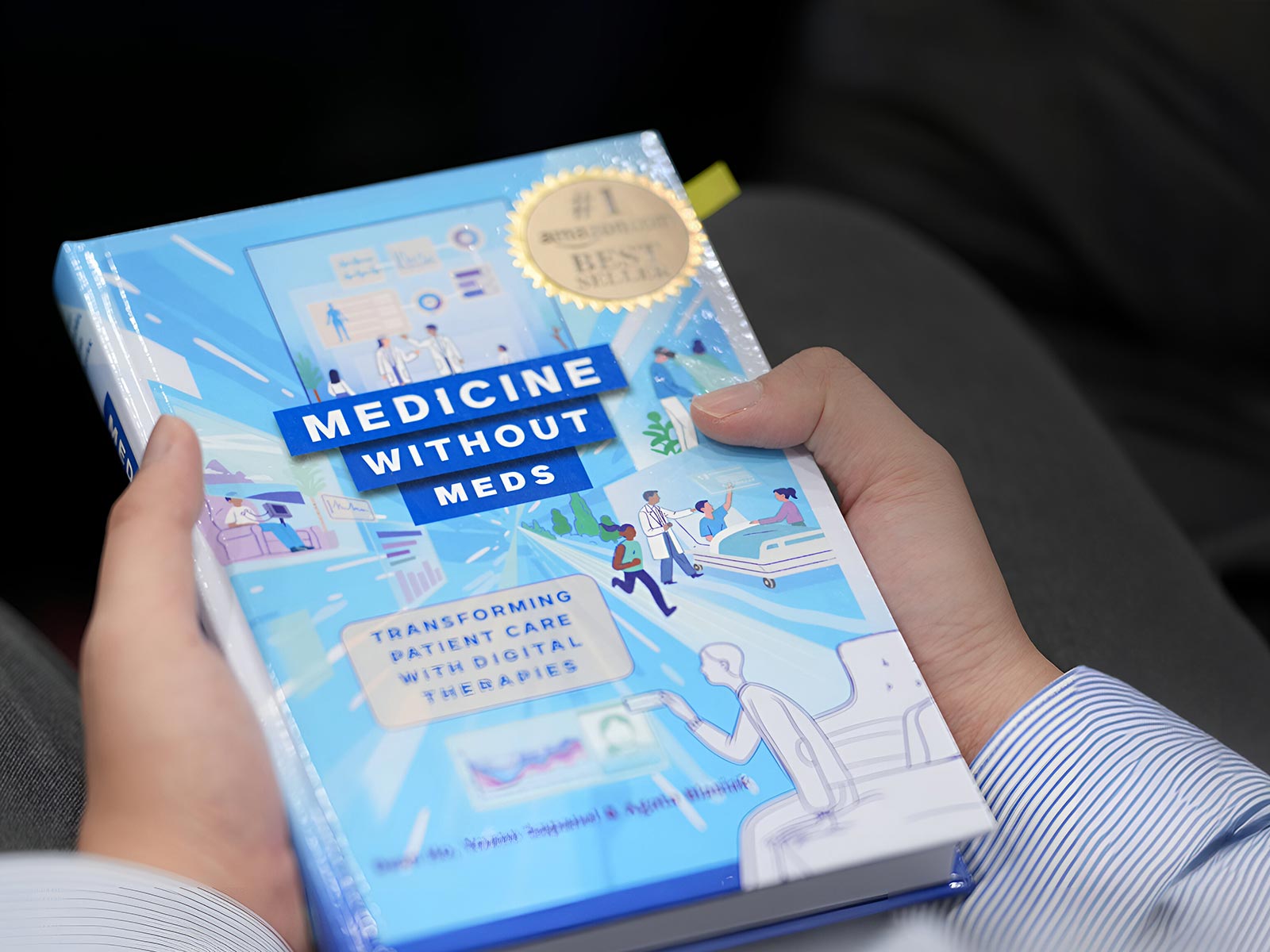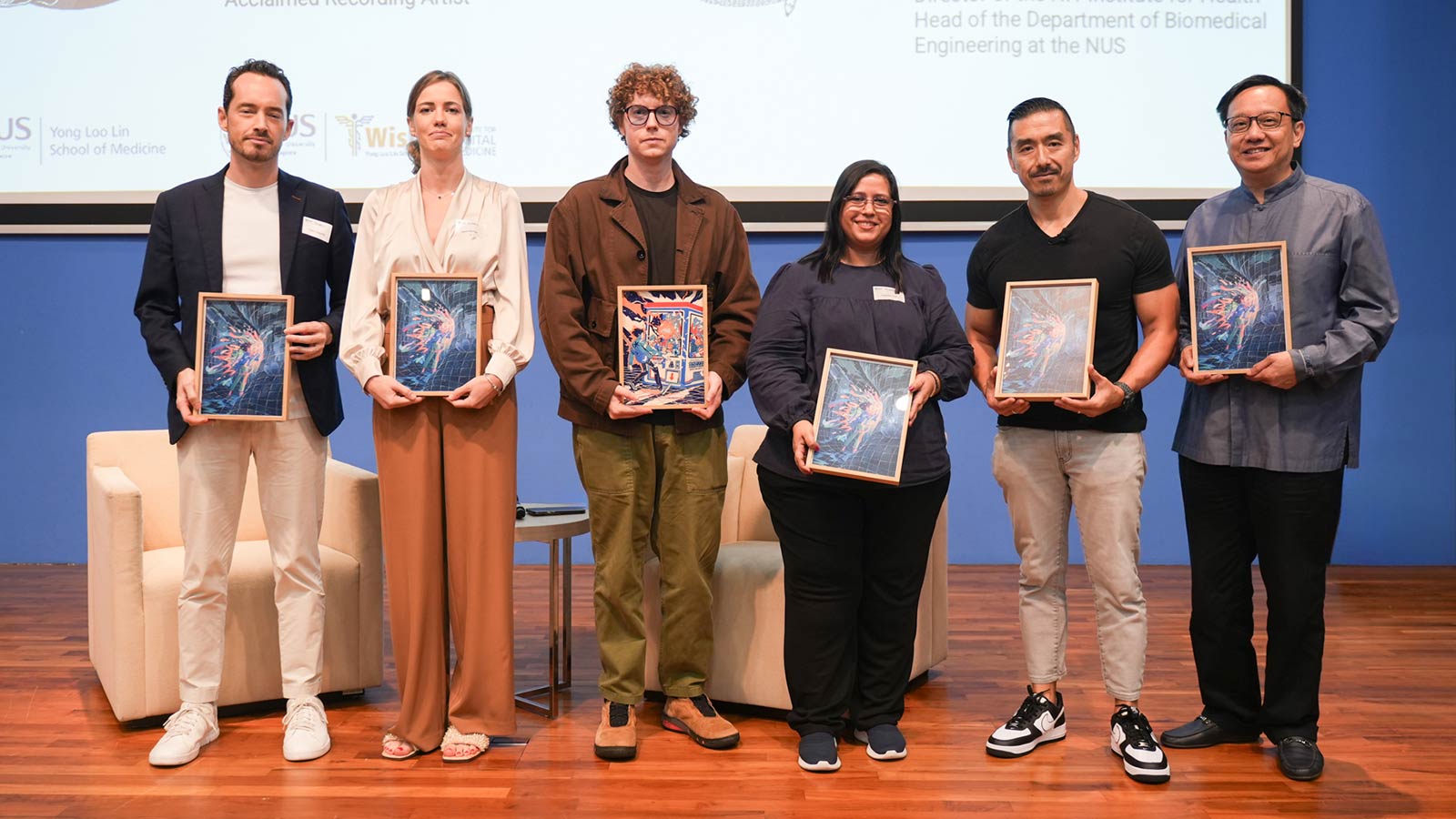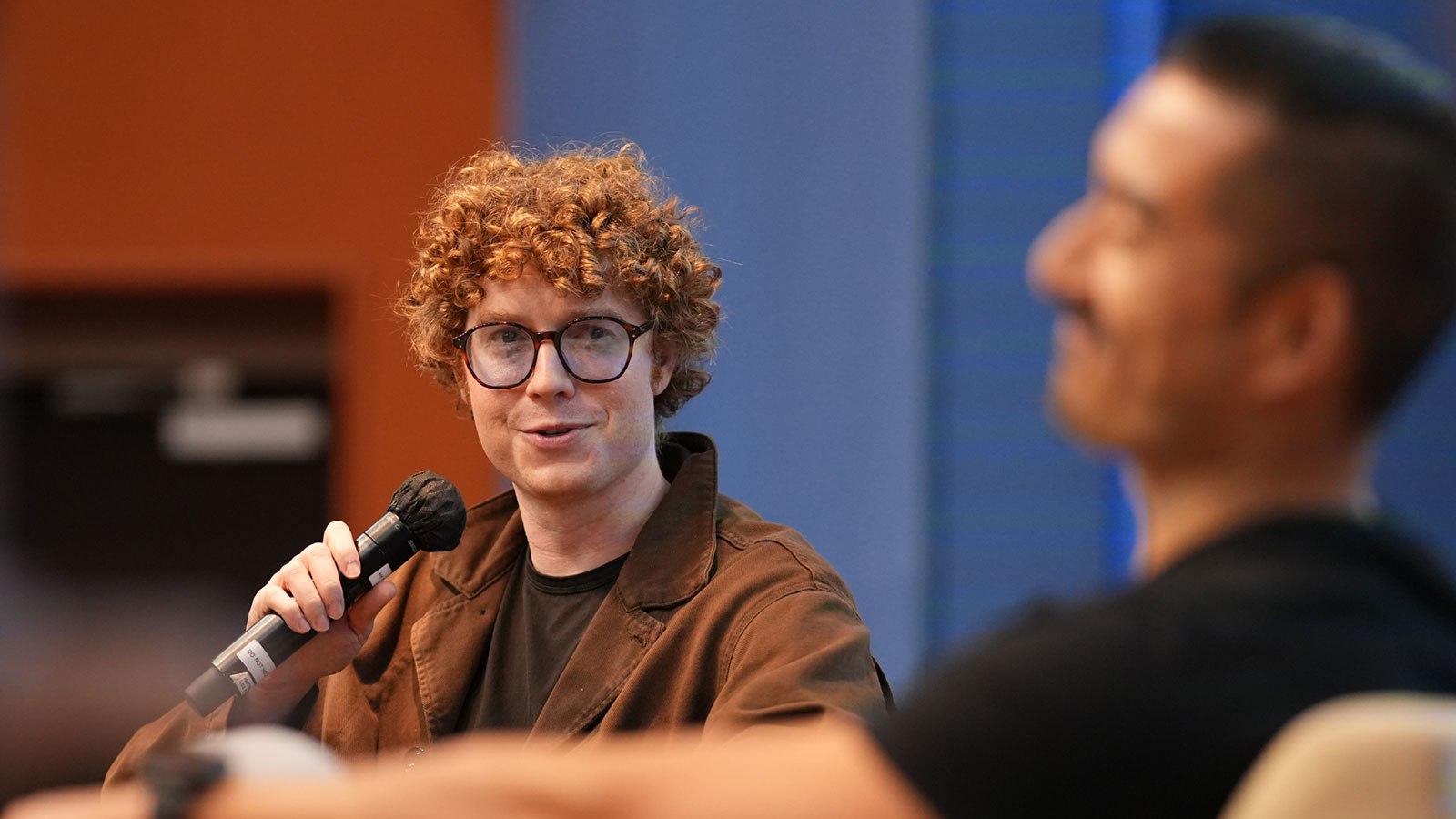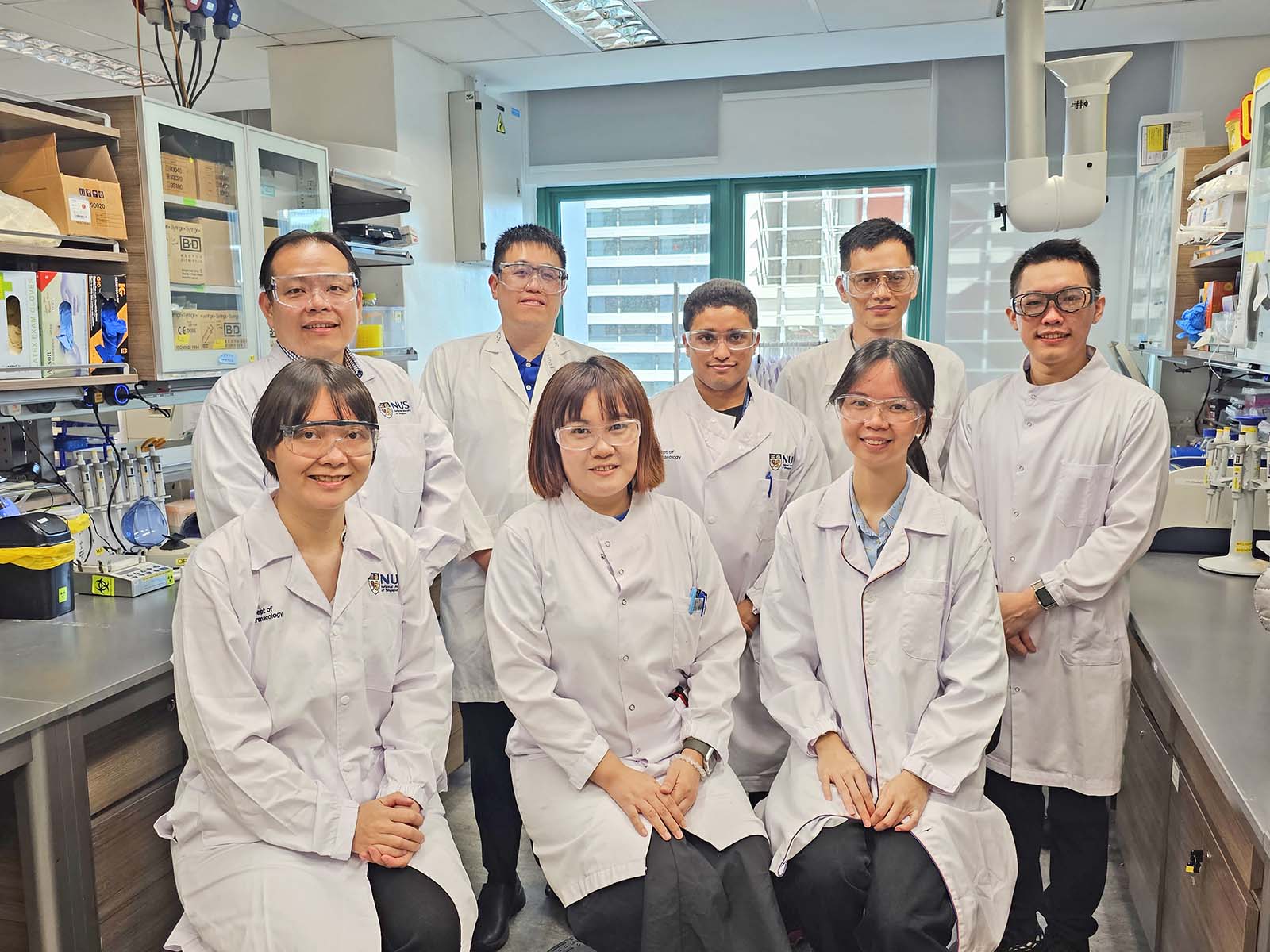
Issue 49
Feb 2024
SCIENCE OF LIFE

A new book written by researchers from the Institute for Digital Medicine (WisDM) at the Yong Loo Lin School of Medicine, National University of Singapore (NUS Medicine) describes digital solutions as a new way to help patients manage symptoms for pain, diabetes, hypertension, cancer and more.
Some patients with sleep disorders, back pain, diabetes, cancer, and attention-deficit/hyperactivity disorder are benefitting from digital health interventions that use software programs, often delivered through mobile apps or web-based platforms, to treat, manage, or prevent a medical condition. Designed to provide therapeutic benefits backed by clinical evidence, these digital interventions often complement traditional healthcare approaches.
“Medicine Without Meds: Transforming Patient Care With Digital Therapies” showcases this new approach, believed to be one of the most promising avenues for improving patient outcomes and the provision of healthcare on a global scale. It also provides a much-needed blueprint for accelerating digital innovation to patients.
While relatively new in the healthcare arsenal, digital therapeutics or DTx, is a new class of medicine akin to drugs. According to the book’s three authors, DTx has the potential to revolutionise patient care by improving access to healthcare, personalising treatment, and increasing convenience in achieving better health.
Written by researchers from WisDM at NUS Medicine, the book provides actionable ways of bringing digital therapy to fruition and inspiring new AI-driven innovations that could revolutionise the future of medicine.
“Our vision is to build good digital solutions that are also cost-efficient and sustainable in the long run. From the birth of an idea to its successful implementation, it is critical to engage the key stakeholders closely, including patients, clinicians and investors. The book offers a roadmap on how digital innovation can be developed and implemented effectively, to serve patients, caregivers, and those who may not be in ill health and want to get better,” said Prof Dean Ho, WisDM’s director and one of the book’s three co-authors.

(From left) Yoann Sapanel, Dr Agata Blasiak, D.A. Wallach, Poonam Rai, Prof Dean Ho, and Prof Chong Yap Seng, Dean of NUS Medicine, celebrating the launch of a new book by WisDM, NUS Medicine.
Since the team was formed in 2018, researchers have developed digital health solutions to help a patient with advanced prostate cancer who was recommended a 50% reduction in dose of an investigational inhibitor drug for increased efficacy, and subsequently resumed an active lifestyle. In a larger cohort of solid cancer patients, personalised treatment with the CURATE.AI platform saw a marked reduction of nearly 20% on average. This digital solution was widely featured at the prestigious American Society of Clinical Oncology (ASCO) Annual Meeting and the ASCO Educational Book. The team also leveraged DTx to address ageing and illness-related challenges in cognitive and physical performance, such as brain cancer and cognitive decline.
In one of the team’s latest DTx projects, conducted in collaboration with local technology and service providers, an application is currently undergoing validation. The app assists patients with hypertension in managing their condition by tracking body vitals, including blood pressure and heart rate, all with just a phone’s camera. Mrs Jenny Pek, 77 years old and a participant of the ongoing study, said, “My doctor has advised me to monitor my blood pressure regularly, and I can easily do that with the help of the app. It provides me useful tips and recommendations that help me keep my diabetes under control.”
Co-author Mr Yoann Sapanel, Head, Health Innovation, WisDM, NUS Medicine, said, “DTx offers a high degree of personalisation tailored to an individual’s needs and progress. They adapt to the user’s specific condition by collecting valuable data on patient progress, which not only benefits patients but also aids healthcare providers in optimising treatment plans, enabling data-driven insights and informed decision-making for the most effective personalised treatment.”
Dr Agata Blasiak, Head, Digital Health Innovation, WisDM, NUS Medicine, is the third author. She said, “DTx plays an important role for Singapore and beyond, as it can allow for decentralised delivery of healthcare at home, for certain conditions. With DTx that can remotely deliver treatment and monitor outcomes, patients need not always visit the clinics or hospitals, and the overall costs of healthcare can be reduced. DTx often works by providing rewarding interactions and nudges through mobile apps, to empower patients to understand and take charge of their condition, make lasting changes in their lifestyle and develop habits for better health and a better life.”
Published as a trade book by the Johns Hopkins University Press, the oldest continuously running University Press in the United States, the book’s foreword is written by American musician and business executive D.A. Wallach, who is passionate about technologies poised to reinvent the practice and delivery of medicine. It also features contributions and insights from various entrepreneurs, executives, patients and clinicians globally, including Associate Professor Ngiam Kee Yuan, Group Chief Technology Officer, National University Health System (NUHS) and Deputy Director of WisDM; Associate Professor Robyn Mildon from NUS Medicine’s Centre for Holistic Initiatives for Learning and Development (CHILD) and Centre for Behavioural and Implementation Science Interventions (BISI), and Founding Executive Director of the Centre for Evidence and Implementation, Australia; Dr Eddie Martucci, CEO and Co-founder of Akili Interactive Labs, United States; and Owen McCarthy, President and co-founder of MedRhythms. The cover was artfully designed by Shian Ng, an acclaimed Singapore artist.
All author proceeds from the sale of the books will be donated to the WisDM Patient Impact Fund, to help patients in Singapore.
Click here for more information on the book.
Book on Digital Medicine Launched by Grammy Award-winning Artiste-entrepreneur
Artiste-technopreneur D.A. Wallach was in Singapore in November 2023 for the launch of “Medicine Without Meds: Transforming Patient Care With Digital Therapies”, for which he wrote the foreword. D.A who is the co-founder of the non-profit Franca Fund for preventive genomics and General Partner of Time BioVentures gave his take on how to recognise the potential for rapid growth and scalability in small businesses.
“It starts with a spark of genuine passion. Occasionally, something stands out and we listen to our instincts. It starts with falling in love, and we then enter a very protracted process—where we evaluate every dimension of the risks associated with the project. After several rounds of assessments and conversations, we tend to have a better understanding of the risks and weaknesses of the plan. If we still want to invest in the business by the end of this process, that is when we go ahead to do it. It’s a combination of being intuitive on one hand, but also rigorous and systematic on the other, so that we ensure diligence in the process and avoid making stupid mistakes.”

D.A. Wallach with Prof Dean Ho.
Curiosity and passion powered his itinerant life journey, from starting a rock band to pursuing his hobby as a venture capitalist. An acclaimed recording artiste who has toured with Lady Gaga, Weezer, and Blink 182, acted in the film La La Land which received 14 Academy Award nominations, and performed on TV Shows including Jimmy Kimmel Live and Late Night with Jimmy Fallon, D.A. was named to the Forbes’ inaugural 30 Under 30 in the music category in 2011. Since 2015, he has set out to build a career as a venture capitalist, backing a series of industry-defining technology companies including Spotify, SpaceX, Ripple, The Boring Company, and Memphis Meats.
Echoing a theme from the book, D.A said healthcare systems need to identify and train people who can work well in collaboration with technology and software. “Having encyclopaedic memory is not what will matter to the physicians of the future. Instead, it will be the ability to rapidly access information to enable, among other things, identifying patients with rare diseases. Today, too many patients go on diagnostic odysseys because no one can pattern-match their disease with what was learned in medical school or seen clinically. We have an opportunity now with technology to give humans a lot more leverage—and I think that will be the crux of the future.”
More from this issue



